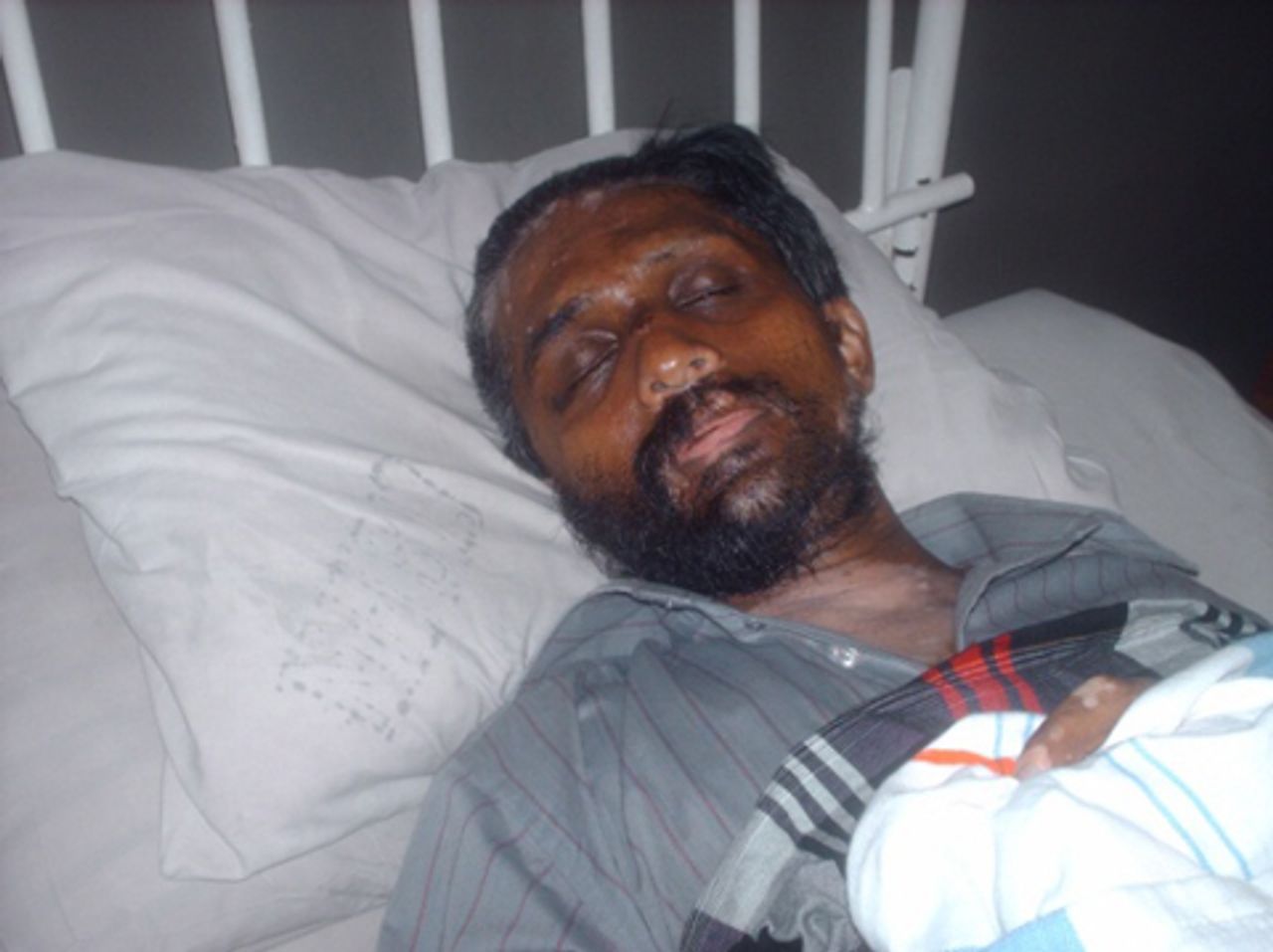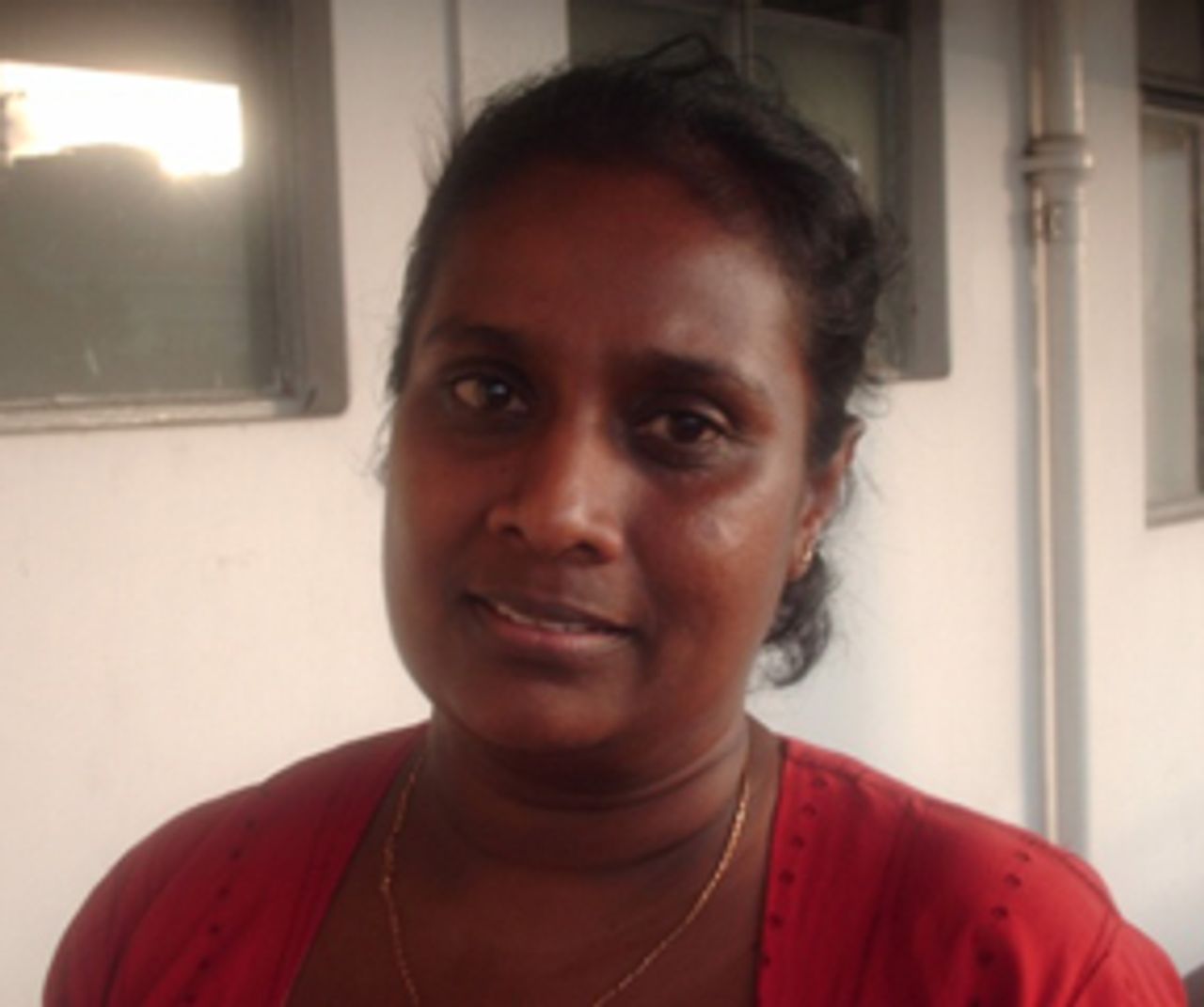Poddala Jayantha, the general secretary of the Sri Lanka Working Journalists Association (SLWJA), was abducted and brutally beaten by an unidentified gang on Monday evening as he walked to his house at Embuldeniya on the outskirts of Colombo. Jayantha is a journalist attached to the government-owned Lake House newspaper group.
 Poddala Jayantha, hospitalized after being brutally assaulted
Poddala Jayantha, hospitalized after being brutally assaultedThe attack followed menacing threats by top defence officials that investigations were being launched into journalists who had allegedly been on the payroll of the Liberation Tigers of Tamil Eelam (LTTE). After the army defeated the LTTE last month, the government of President Mahinda Rajapakse has whipped up an atmosphere of communal triumphalism and intensified its harassment and intimidation of anyone critical of the government and the military.
The circumstances surrounding the assault on Jayantha point to the involvement of pro-government thugs, either associated with, or directly supported by, the security forces. Over the past three years, journalists and the media have been systematically hounded, and in some cases killed, by thugs linked to the government and the military.
The journalist was hauled into a van at Embuldeniya Junction at around 5.15 p.m. on Monday while he was returning from work. Several people gathered around when he shouted for help but the attackers rapidly drove off. He was severely beaten and dumped on the wayside at Gothatuwa, about 15 kilometres away. Some local youth took him to the Colombo National Hospital.
WSWS reporters visited Jayantha at the hospital on Tuesday. He said he could not speak properly due to the pain caused by his injuries. One leg was fractured and the other was swollen. He had been beaten all over his body and had sustained a small injury to his head. The hospital director told the media that although the injuries were not life threatening, an operation was needed to fix his fractured leg.
 Kalyanie, Jayantha’s wife
Kalyanie, Jayantha’s wifeJayantha’s wife, D. N. Kalyanie, told the WSWS that they had both been concerned about his security. On January 7 last year a white van and a police jeep came to their home, then at Kahatuduwa, a village about 28 kilometres from Colombo, men dressed in plain clothes claimed to be from the police, but retreated as locals started to gather around.
On May 28 last year, Jayantha and SLWJA president Sanath Balasooriya were summoned by defence secretary Gotabhaya Rajapakse, the Sri Lankan president’s brother. He warned the two men not to criticise the military and hinted that harm could come to anyone who smeared the reputation of the “revered” army chief, Lieutenant General Sarath Fonseka.
When the SLWJA held protests against the government’s attacks on the media, Jayantha received death threats over the phone. After the assassination of Sunday Leader editor Lasantha Wickrematunge in January, Jayantha received another spate of phone threats. He fled the country along with about a dozen other journalists and recently returned.
Kalyanie explained: “On Monday evening, I got a telephone call from him at 4.15 p.m. saying he was returning from the office. He didn’t say where he was or which way he was travelling for security reasons. I was anxious because he was late. His telephone had been switched off.”
Kalyanie received a call from Benet Rupasighe, the news editor of Lanka-e-News, warning her to be watchful about Jayantha, indicating he might be attacked. As soon as she heard of her husband’s abduction, she lodged a complaint at the area police station at Mirihana.
Describing the attack, she said: “The gang had put him in the van face down and hit him with a blunt or wooden weapon to break his legs. He fell unconscious from time to time. They crudely cut off his beard and hair. He can only remember that the gang threatened him saying, ‘hereafter [you should] live silently like a dog’.”
Kalyanie accused a state television channel of broadcasting photos of her husband and another media person while denouncing journalists for supporting the LTTE and taking money from it. She believes that this insinuation encouraged the attack.
Reporters without Borders, the media rights group based in France, issued a statement on June 2 saying: “Political gangs are celebrating the military defeat of the Tamil Tiger rebels in their own fashion, in this case by abducting and torturing a press freedom activist. The government must take energetic measures to put a stop to this continuing war against the media and human rights activists. We express our complete solidarity with Poddala Jayantha, who acted with courage in defending his fellow journalists.”
The Committee to Protect Journalists said the attack on Jayantha was part of a trend. “These attacks are a chilling reminder that journalists remain under attack in Sri Lanka even after the end of the government’s battle with Tamil separatists,” it stated.
The police said they had appointed two teams to investigate the assault. But nothing will come of these investigations. Since the Rajapakse government restarted the country’s civil war in 2006, there have been abductions, assaults and killings of journalists and attacks on media outlets. The government and police have promised investigations before, but have not arrested or charged anyone.
On January 8, Sunday Leader editor Lasantha Wickrematunge was murdered in broad daylight as he drove to work on a busy suburban road. Two days earlier, an armed gang ransacked the MTV/Sirasa broadcasting building. Police still claim have no clues in these investigations. On both occasions, the attackers escaped even though the security forces maintain roadblocks throughout the city and conduct frequent patrols. The only possible conclusion is that these gangs enjoyed support from the authorities.
These attacks are aimed at silencing all criticism of the war, the government’s policies and even how the war was conducted. Dozens of journalists have fled the country. Journalists have also been detained, including the prominent Colombo-based Sunday Times columnist J.S. Tissainayagam, who is being held under the draconian Prevention of Terrorism Act.
In an apparent diversion, police detained news editor Benet Rupasinghe and Lanka-e-News editor in chief Sandaruwan Senadheera over the assault on Jayantha. Their only “crime” was to inform the Inspector General of Police (IGP), the president’s secretary and the media minister of his abduction.
Police questioned them on how they knew about the incident. But a local court magistrate refused a police request for further detention and ordered them to be released on bail. Jayantha wrote a letter to the police, saying that arresting people “who worked to protect my life is a crime”.
Media minister Lakshman Yapa Abeywardena on Tuesday condemned the attack on the journalist. But in the same breath he declared that journalists were among those under investigation over their alleged links with the LTTE. He said investigations were also underway against army officers, businessmen and politicians who had connections with the LTTE. When a journalist challenged him to reveal the names of those who allegedly had connections with the LTTE, the media minister refused.
In an interview with the state-owned ITN television channel on May 26, army commander Fonseka branded journalists who criticised the military as LTTE supporters. Fonseka declared that journalists who demonstrated for press freedom had been “constantly on the LTTE’s payroll”. He accused them of “obstructing the legitimate activities of the army” and said they “should be prosecuted for treason”.
A day after the bashing of Jayantha, the Centre for Policy Alternative (CPA)—a Colombo-based think tank—received a threatening “Letter to the Traitors”, which said: “Even though the terrorism is now over we have been observing the behaviour of people like you who were dependent on them [the LTTE].”
The letter demanded that the centre hoist the national flag for a week and donate one million rupees to the Api Venuven Api, a welfare program for soldiers. It also demanded a halt to all programs conducted by the institute “which are detrimental to the sovereignty, unitary nature, and dignity of this country”.
The fresh attacks on journalists and threats to government critics mark a new stage of the offensive against the basic democratic rights of working people. This is a warning that the same ruthlessness that the regime has displayed in detaining nearly 300,000 Tamils in the north will be directed against the entire working class as the government prepares a far-reaching assault on living standards amid a deepening economic crisis.
